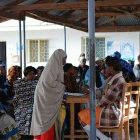
[ABUJA] A research paper on abortion has called for the liberalisation of abortion laws in Malawi, which deny elective abortions and the prioritisation of emergency healthcare for post-abortion complications.
Mayamiko Gama, a programme assistant from Malawi's Family Planning Research Centre, presented the research last week (3 February) at the biannual African Conference on Sexual Health and Rights in Abuja, Nigeria.
The study, carried out in four Malawian districts, used a quantitative questionnaire and checklist, 16 qualitative focus-group discussions with young people aged 10 to 24, and interviews with community and religious leaders, health workers and traditional healers.
The results indicate that abortion cases are highest among single adolescents (aged 15–19) and that complications from unsafe abortions in school-age girls account for between 16 and 40 per cent of admissions to gynaecological wards in public hospitals in Malawi.
Traditional and religious leaders consider abortion to be a sin and, although they acknowledge that it takes place in private, felt there were no grounds for legalising it.
"Most abortions in Malawi are not safe, leading to complications such as haemorrhage, infection, infertility and death," said Gama. Overdosing on drugs such as quinine, drinking powdered soaps and using herbs from traditional healers were cited as the most common methods of illegal abortion in Malawi.
"They seek abortions because they are unable to afford the child, or out of fear of having to drop out of school –– although the laws have been changed recently to allow a girl to continue with her education," said Gama. Other reasons include peer pressure, concerns about losing a partner, fear of excommunication from the Church, and demand by parents.
The study, conducted in June 2007, recommends increased dissemination of contraception information to avoid the need for abortion, as well as promotion of discussion, at all levels of society, about abortion in Malawi to encourage liberalisation of the abortion law.
Adolescents seeking post-abortion hospital care should be treated as an emergency to prevent unnecessary complication and death, says the study. Gama pointed out that hospital is a last resort for many girls because of the social stigma of having undergone an abortion.

No comments:
Post a Comment